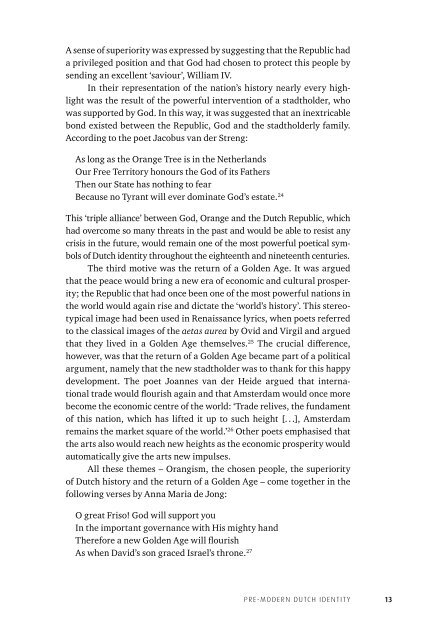Discord Consensus
7aze300jFJo
7aze300jFJo
You also want an ePaper? Increase the reach of your titles
YUMPU automatically turns print PDFs into web optimized ePapers that Google loves.
A sense of superiority was expressed by suggesting that the Republic had<br />
a privileged position and that God had chosen to protect this people by<br />
sending an excellent ‘saviour’, William IV.<br />
In their representation of the nation’s history nearly every highlight<br />
was the result of the powerful intervention of a stadtholder, who<br />
was supported by God. In this way, it was suggested that an inextricable<br />
bond existed between the Republic, God and the stadtholderly family.<br />
According to the poet Jacobus van der Streng:<br />
As long as the Orange Tree is in the Netherlands<br />
Our Free Territory honours the God of its Fathers<br />
Then our State has nothing to fear<br />
Because no Tyrant will ever dominate God’s estate. 24<br />
This ‘triple alliance’ between God, Orange and the Dutch Republic, which<br />
had overcome so many threats in the past and would be able to resist any<br />
crisis in the future, would remain one of the most powerful poetical symbols<br />
of Dutch identity throughout the eighteenth and nineteenth centuries.<br />
The third motive was the return of a Golden Age. It was argued<br />
that the peace would bring a new era of economic and cultural prosperity;<br />
the Republic that had once been one of the most powerful nations in<br />
the world would again rise and dictate the ‘world’s history’. This stereotypical<br />
image had been used in Renaissance lyrics, when poets referred<br />
to the classical images of the aetas aurea by Ovid and Virgil and argued<br />
that they lived in a Golden Age themselves. 25 The crucial difference,<br />
however, was that the return of a Golden Age became part of a political<br />
argument, namely that the new stadtholder was to thank for this happy<br />
development. The poet Joannes van der Heide argued that international<br />
trade would flourish again and that Amsterdam would once more<br />
become the economic centre of the world: ‘Trade relives, the fundament<br />
of this nation, which has lifted it up to such height [. . .], Amsterdam<br />
remains the market square of the world.’ 26 Other poets emphasised that<br />
the arts also would reach new heights as the economic prosperity would<br />
automatically give the arts new impulses.<br />
All these themes –Orangism, the chosen people, the superiority<br />
of Dutch history and the return of a Golden Age –come together in the<br />
following verses by Anna Maria de Jong:<br />
O great Friso! God will support you<br />
In the important governance with His mighty hand<br />
Therefore a new Golden Age will flourish<br />
As when David’s son graced Israel’s throne. 27<br />
Pre-modern Dutch identity 13


